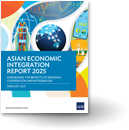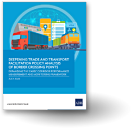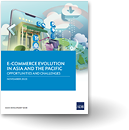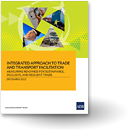Regional Public Goods
Selected Regional Public Goods (RPGs) of Association of Southeast Asian Nations (ASEAN) on human resource development, health, and environment
The Association of Southeast Asian Nations (ASEAN) was established on 8 August 1967 in Bangkok, Thailand. It includes Brunei Darussalam, Cambodia, Indonesia, Lao People’s Democratic Republic, Malaysia, Myanmar, Philippines, Singapore, Thailand, and Viet Nam.
The ASEAN University Network (AUN) was established in November 1995. The main objective of the AUN is to strengthen the existing network of cooperation among leading universities in ASEAN, by promoting cooperation and solidarity among ASEAN scholars and academicians, developing academic and professional human resource, and improving information dissemination among ASEAN academic community.
In response to the outbreak of Severe Acute Respiratory Syndrome (SARS), the Special ASEAN Leaders’ Meeting was held in Bangkok, Thailand on 29 April 2003. The ASEAN Severe Acute Respiratory Syndrome (SARS) Containment Information Network was established as a result of the Special ASEAN Leaders Meeting. The network shares information, best practices, and new findings on SARS transparently, helping each member contain SARS domestically and across borders.
The 7th ASEAN Summit on HIV/AIDS adopted the ASEAN Work Programme on HIV/AIDS II (2002-2005) and identified access to essential HIV/AIDS drugs as a priority area for ASEAN cooperation. The ASEAN-Disease-Surveillance.Net was established to promote Regional Infectious Disease Outbreak Recognition and Response Activities.
The 12th Meeting of the ASEAN Experts Group on Disaster Management (AEGDM), held on 16-18 September 2002 in Viet Nam, agreed to restructure the AEGDM into an ASEAN Committee on Disaster Management (ACDM). To intensify ASEAN cooperation in disaster management, the Committee also decided to meet annually instead of once every two years. The ASEAN Agreement on Transboundary Haze Pollution, which was signed in June 2002, signifies the culmination of concerted and intensive regional efforts over the years to address transboundary haze pollution since the 1997-98 severe haze episodes. The agreement seeks to institutionalize and enhance existing arrangements under the Regional Haze Action Plan (RHAP) and to provide a legal framework to better facilitate regional and international cooperation in addressing transboundary haze pollution problem more effectively.
Agreements
- Declaration of the 7th East Asia Summit on Regional Responses to Malaria Control and Addressing Resistance to Antimalarial MedicinesAssociation of Southeast Asian Nations (ASEAN) Secretariat20 Nov 2012
- Joint Statement of ASEAN Environment Ministers for the 11th Meeting of the Conference of the Parties to the Convention on Biological DiversityAssociation of Southeast Asian Nations (ASEAN) Secretariat29 Oct 2012
- Memorandum of Understanding for the joint action to reduce HIV/AIDS vulnerability related to population movement in the Greater Mekong Subregion20 Dec 2011
- ASEAN Leaders Statement on Joint Response to Climate ChangeAssociation of Southeast Asian Nations (ASEAN) Secretariat9 Apr 2010
- Joint Statement of the Fifth ASEAN Education Ministers Meeting (5th ASED)28 Jan 2010
News
- Philippines reaffirms [ASEAN Observer Team] leadership role to defuse border tensionsKhmer Times13 Feb 2026
- Cambodia: Cashew sector seeks skills upgrade with ADB supportKhmer Times12 Feb 2026
- Indonesia urges stronger ASEAN cooperation against dengue threatAntara9 Feb 2026
- Cambodia, [Viet Nam, Lao People's Democratic Republic] leaders promote regional peace, stabilityAsia News Network9 Feb 2026
Opinions and Editorials
- ASEAN knows what [US President] Trump wants, but did it give away too much?Channel News Asia30 Oct 2025
- Malaysia's ASEAN Chairmanship charts a more resilient and integrated futureThe Edge19 Feb 2025
- Political stability, terrorism, and ASEAN: A focus on Singapore, Indonesia, and MalaysiaEurasia Review23 Jan 2025
- Strengthening ASEAN’s responses to transnational crimeEast Asia Forum25 Sep 2024
Studies and Research
- Experiences of ASEAN migrant workers during COVID-19: Rights at work, migration and quarantine during the pandemic, and re-migration plansInternational Labour OrganizationInternational Labour Organization3 Jun 2020
- Toward Energy Security in ASEAN: Impacts of Regional Integration, Renewables, and Energy EfficiencyY. Liu, Z. Sheng, and D. AzhgaliyevaAsian Development Bank1 Nov 2019
- Rational Use of Medicines in the ASEAN RegionASEAN SecretariatAssociation of Southeast Asian Nations (ASEAN) Secretariat11 Apr 2017
- ASEAN mutual recognition arrangement for Indonesian nurses: is it a promise?J. Gunawan and Y. AungsurochInternational Journal of Community Medicine and Public Health1 May 2015
Meetings
- Special Meeting of AICHRAssociation of Southeast Asian Nations (ASEAN) Secretariat28 Nov 2015
- ASEAN Young Leaders Summit (AYLS)Association of Southeast Asian Nations (ASEAN) Secretariat18 Nov 2015
- Special Meeting of AICHRAssociation of Southeast Asian Nations (ASEAN) Secretariat1 Aug 2015
- Special Meeting of AICHRAssociation of Southeast Asian Nations (ASEAN) Secretariat13 Jun 2015




